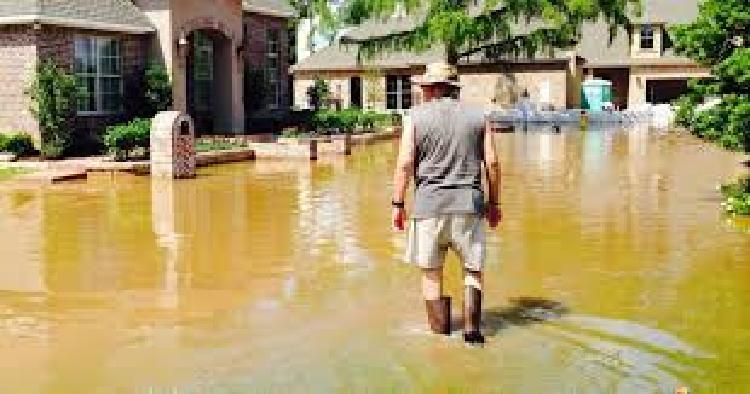
What to Do if Your House Floods: Recovery and Future Safety
Emergency services declared your neighborhood safe to return to. You almost wish they hadn’t.
Cleaning up your house after being bogged down with flood water is a huge job to take on.
It’s dangerous and dirty work. But we’re here to help you figure out what to do if your house floods.
Good thing you have the best residential dumpster rental service at your fingertips for times like these.
Cleaning up after a flood is already required lots of expensive work you hadn’t been budgeting for.
You had to wait weeks just to get back into your home. Don’t wait long to get rid of all the debris that piled up.
Bin There Dump That will have a dumpster at your doorstep within hours. Once you’re ready to go with your dumpster, use these tips if you’re still wondering what to do when your house floods.
What to Do After a Flood in Your House
1. Stay Away from Flood Water
This needs to be your top priority when dealing with a flood. Flood water can bring toxic chemicals and debris with it.
A London University combed through post-flood data to see if there is any connection between extreme weather and an increase in bacterial infections.
Their findings proved their hypothesis to be true. Bacterial infections did rise after regional floods. The most common strains found in flood water include leptospira and vibrio.
Both can be fought with antibiotics, but leptospirosis doesn’t always cause symptoms.
Left untreated it can lead to anything from meningitis to liver failure. To protect yourself from vibriosis keep all wounds tightly bandaged and away from flood water.
Vibrio vulnificus is a strain of the bacteria that causes huge legions all over the skin. This has led to its reputation as a “flesh-eating” disease.
Don’t return home until emergency services declare it safe.
2. Get Air Flowing
Your plan of attack when asking what to do if your house floods should include lots of fans.
Drying out a house requires constant airflow. If there is still water you’re going to need a specialized tool called a sump pump to get it out.
After any water is gone power on multiple dehumidifiers so moisture doesn’t keep cycling through the house.
A wet shop vac will also come in handy for sucking the last of the water out of carpets and rugs. Don’t try using your regular household vacuum because these don’t have water protection.
Start tearing out the vinyl and linoleum in any affected rooms so moisture doesn’t collect and start breeding mold. You’re going to need a dumpster rental service for all this garbage.
There’s a great way to prevent further damage if your family’s photo albums were under water.
Put them in plastic bags and store them in the freezer. This stops them from decaying any further while you restore the rest of your house.
When you have more time just take out the albums and let them properly air dry.
3. Dealing with Insurance
If you lost something valuable in the storm, make sure to hold on to it to show your adjustor.
This doesn’t mean you have to wait for your adjustor to start cleaning. Take photos along the way to document any property loss or damage.
Flood insurance is separate from regular homeowner’s insurance. Unless you buy additional insurance to cover flooding, your regular insurance won’t help.
4. Surviving Home Flood Recovery
A flood can mean chaos and you might be cut off from food and water. If you have no other options you can strain water through an old rag and boil it for several minutes to kill off any bacteria.
If there’s no heat source, like a stove, bleach is going to be your best friend.
A few tablespoons of bleach can clean enough water to last a family for days.
Canned food is also your safest bet in an emergency situation. You’ll still need to remove the labels and disinfect the can in bleach water before opening.
When it comes to utensils and cooking gear, throw away anything wood or plastic. These materials are porous and not worth endangering your life for.
Use hot soapy water for metal and ceramic cookware and sanitize by boiling or with bleach.
My House Is Flooded, What Now?
Recovering from a hurricane is one of the hardest things to go through. It’s why being prepared is so vital to staying safe during a hurricane.
Fortunately, you’re planning ahead so you’re not panicking the last minute before a storm asking yourself what to do if your house floods.
If you’re remodeling you’ve already got a full plate. From scheduling contractors to make sure you have a hotel booked when working on your bedroom.
Don’t bother with dumpster rental companies that make you do all the heavy lifting.
Partner with Bin There Dump That for a scuff-free driveway and a smooth dumpster rental experience.
Call now for a free quote!
Related Blog Posts
- Revive Your Home for Spring with This Spring Home Maintenance Checklist
- 10 New Home Trends That Will Make Your Friends Jealous
- How Our Dumpsters Support Realtors and Property Managers: A Comprehensive Guide
- 12 Jaw-Dropping Clutter Statistics That Will Make You Want to Declutter Today!
- Unlocking Space: The Complete Guide on Pocket Door Installation
- Step by Step Guide on How to Install Carpet Like a Pro